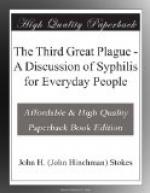+Marriage and Contagion in Hereditary Syphilis.+—In general it may be said that, in the matter of marriage, persons who have hereditary syphilis and live to adult life with good general health can, after reasonable treatment, marry without fear of passing on the disease. Hereditary syphilis apparently is not transmitted to the children as acquired syphilis is. Hereditary syphilis practically is not contagious except during the eruptions and active manifestations in infancy, such as the nasal discharge and the other sores in the mouth and about the genitals. As adults they can enter into the intimate relations of life without risk. Many of them, while perhaps having positive blood tests while the disease is active, later become negative without treatment. Some of them even recover from the disease to the extent that they can acquire it again, since there is no absolute immunity.
+Syphilis in Adopted Children.+—A word might well be said at this point on the adoption of children with hereditary syphilis. In all probability this is not a common occurrence, certain factors tending to diminish the risk. A child adopted after its second year will not be so likely to have the disease, since most syphilitic children die before this age is reached. Agencies which arrange for the adoption of children are now much more careful about the matter than formerly, and a Wassermann test on the mother and also on the child, as well as a careful history in the case of the mother, is frequently available. The information in regard to the mother is quite as important as that about the child, since the child may have a negative test while the mother’s may be positive. Children who have hereditary syphilis, even in latent form, should not be offered for adoption, and should become a charge upon the state. Families in which it later develops that an adopted child was syphilitic should not, however, be needlessly alarmed for their own safety, since, from the standpoint of infectiousness, the late forms of hereditary syphilis are not dangerous to others. The agency from which the child was adopted should assume responsibility for the child if the family cannot meet the situation. The state of Michigan has been a pioneer in this country in legislation which provides for the welfare of these children among others. A law has been enacted making it possible to provide for their medical treatment for an indefinite period in the state hospital at Ann Arbor, at the cost of the state.
+Treatment of Hereditary Syphilis.+—The question of the treatment and cure of a person with hereditary syphilis is in many respects a different one from that in an acquired case. The foothold which the germ has in the body in hereditary syphilis is stronger even than in an untreated acquired case. Many of the changes produced by it are permanent, and the prospects of completely eradicating it are correspondingly small. On the other hand, the child who survives hereditary syphilis has probably




